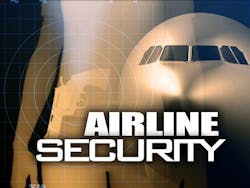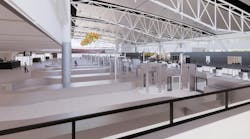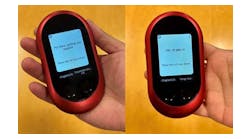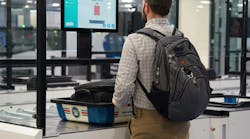For Americans at airports, train stadiums and sporting arenas, the post-Boston reality will mean beefed-up security patrols, bomb-sniffing dogs and the occasional false alarm.
A day after the attack on the Boston Marathon, Homeland Security Secretary Janet Napolitano announced she is stepping up security at transportation hubs nationwide "out of an abundance of caution," using "measures both seen and unseen." Amtrak and the New York and Washington subway systems have amped up security, and scares at airports on Tuesday included a partial evacuation of New York's LaGuardia because of a suspicious package.
In New York, rattled travelers called in suspicious bags in the past 24 hours at more than triple the usual rate, Police Commissioner Ray Kelly said Tuesday.
The House's top Homeland Security leaders told POLITICO that the blasts are evidence the U.S. needs to continue moving toward a "risk-based" security system, concentrating on big cities, crowded events and transportation hubs. But the lawmakers disagreed on one element of that system -- the Transportation Security Administration's recent move to allow some types of small knives on planes in the name of allowing screeners to focus on bigger risks like explosives.
The House leaders agreed on one thing, however: The transportation networks that millions of Americans pass through every day are loaded with vulnerable soft targets.
"Quite honestly, we've been surprised for a while that something like this hasn't already happened," said House Homeland Security Chairman Mike McCaul (R-Texas).
"We know where the threats are," McCaul said. "It's D.C., New York, Chicago, L.A. and Houston and some other cities, as well. It happened in Boston. They happen time and time again in cities. [The strategy] should be more risk-based."
He and top committee Democrat Bennie Thompson of Mississippi said Homeland Security has told them that safeguards have been stepped up specifically in New York, Boston and Washington.
At a news conference Tuesday, New York Mayor Michael Bloomberg called the bombing a "terrible reminder" of why the city has invested so much in security. Kelly said "no specific threats" have been made against New York, but the city has redeployed resources as if it were a target anyway.
This kind of reassessment is natural after traumas like the Boston bombings, said Henry Willis, director of Rand Corp.'s Homeland Security and Defense Center.
He added that large crowds will always offer the "potential for things to go wrong."
Bustling public areas like subway stations and other transit hubs are particularly vulnerable, McCaul said, adding that it wouldn't be difficult for anyone, especially a "lone wolf," to bring an improvised explosive device into a packed underground train station.
"We know they continue to target transportation. Whether it's aviation, or it could be subway," McCaul said. "I would still submit the subway's very vulnerable. The canines are doing a good job, but they are still very, very vulnerable to an attack."
McCaul said he expects to see more bomb-sniffing dogs at crowded events.
Asked about the similarities between crowds at a sporting event like the marathon and a busy transportation hub, Thompson agreed with McCaul that vulnerabilities exist.
"There are a lot of soft targets in this country," Thompson said.
A spokesman for New York's Metropolitan Transit Authority, which runs the state's subway plus two of the busiest commuter rail lines in the country, said the MTA's police department is stepping up coverage and bag inspections, perhaps indefinitely.
"The increased coverage will continue until we fully understand the cause of the explosions in Boston," spokesman Aaron Donovan said in an email.
Similar increases in security are underway on Washington's Metro, Dan Stessel, Washington Metropolitan Area Transit Authority spokesman, said, including canine patrols. Stessel added that while Metro doesn't disclose when and where it checks bags for explosives, it views "random explosive screening as an important tool."
Amtrak police have stepped up sweeps at stations and coordination with federal and local law enforcement agencies and are warning customers not to leave bags unattended, spokesman Steve Kulm said.
But even with heightened security, 100 percent safety at crowded events might be a phantom.
"The people who do this every day say there is absolutely no way you can guarantee something bad won't happen if somebody's committed to it," Thompson said. "We've just got to do the best job we can with the best people and the best resources available."
Among other incidents after the blasts, a plane was stopped on the ground at Boston's Logan International Airport on Tuesday to allow for a rescreening of bags, while a US Airways flight was held after landing so authorities could inspect the baggage, The Associated Press reported. Part of LaGuardia was evacuated because of a suspicious package. And the Federal Aviation Administration is still restricting some airspace around the blast area.
Still, ground transportation seems to dominate leaders' concerns.
One reason is that a terrorist could never smuggle a bomb on to an airplane like the pair that exploded in Boston, said Douglas Laird, an aviation security consultant. News accounts described the bombs as pellet-filled pressure cooker devices.
Those types of bombs would be easily detected by Transportation Security Administration and "are not a threat to aviation," Laird said. Instead, TSA is more concerned about small quantities of explosives that could be smuggled past agents and used to blow a hole in the fuselage. That would allow air in the plane and could trigger a secondary explosion.
"Even with TSA not doing a very good job, there's no way you could get something like that on an airplane," said Laird, who previously served as head of security for Northwest Airlines. "It's just too obvious."
Transportation Secretary Ray LaHood wouldn't comment on whether the Boston incident points to a need for greater federal spending on infrastructure and security, but he said U.S. fliers should not be worried about safety.
"I think our aviation system is the safest in the world; I really do," he told POLITICO after speaking at an unrelated conference. "And I think we've done a lot to encourage safety, and we've done a lot to invest in safety."
One area of disagreement remains TSA's new knife policy, which takes effect April 25. Both McCaul and Transportation Security panel Chairman Richard Hudson (R-N.C.) support the new policy as further moves toward passenger-friendly, risk-based security. But Thompson and more than 100 other House members of both parties disagree.
The TSA has said the new rule will allow more concentration on explosives, which terrorism experts say are the country's greatest threats -- but Thompson said TSA's front-line defense is about more than explosives.
"I know that a knife 2.36 inches long is a weapon, and if we have the right to make a zero tolerance on something like that and the technology to pick it up, we ought to do it," he said. "Somebody said, 'Well, the passengers are going [to stop an attack.].' But that's not how we build a secure system."
Adam Snider, Kathryn A. Wolfe and Scott Wong contributed to this report.
Copyright 2013 Capitol News Company, LLCAll Rights Reserved




